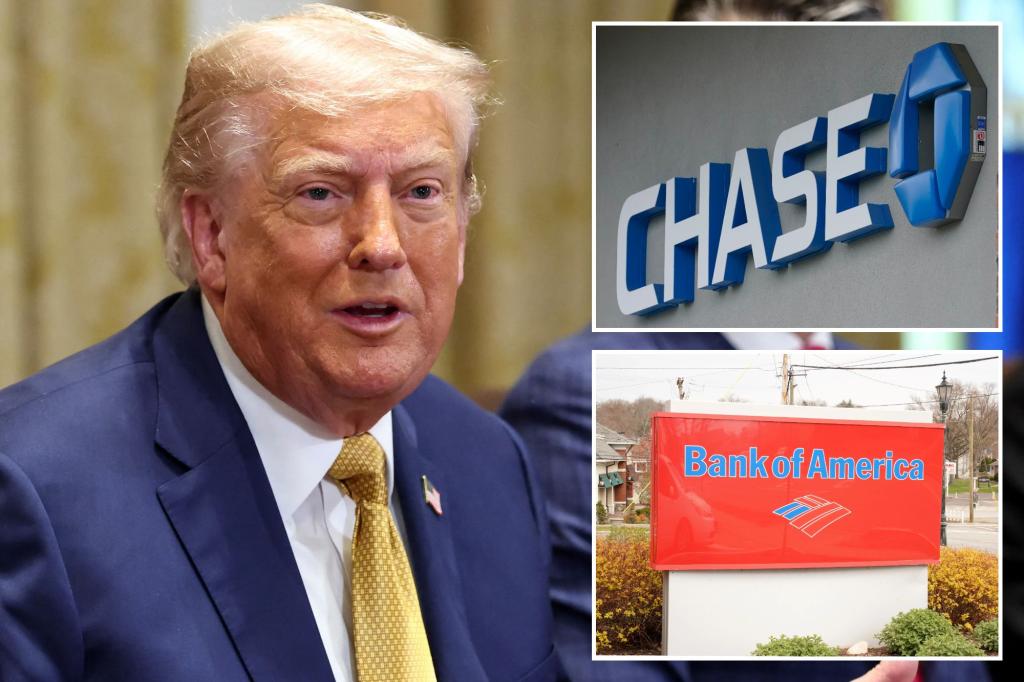The scale of the effort to “debank” Donald Trump because of pressure from Biden administration regulators went far beyond JPMorgan and Bank of America, The Post has learned.
At least 10 other financial institutions closed their windows to the billionaire real estate tycoon over his role in the Jan. 6 Capitol Hill melee.
The moves came in the months after Trump left the White House in 2021, sources inside the Trump Organization told me.
The stunning scale of the blacklisting is being revealed here for the first time.
It should be reported as much as possible for the simple reason that if any big bank can cancel a former president over politics as opposed to illegality, then every American citizen is in danger of facing the same mistreatment.
For expressing an opinion, or starting a business out of step with the progressive culture norms that have infected so much of society, you too can see your economic livelihood go up in smoke and “debanked.”
Debanking is such an odd word for one of the most insidious parts of cancel culture, and its sponsors like it that way.
It sanitizes, via clumsy, obtuse lingo, what is essentially something of dangerous Orwellian magnitude: negating an American citizen’s ability to save, and conduct business through a big bank.
That’s why Trump and Republicans like South Carolina Sen. Tim Scott are taking steps to end the politicization of banking.
Keep in mind, there are already laws preventing the likes of JPMorgan, BofA and Capital One — the banks Trump has publicly stated canceled him — from being conduits for drug kingpins and Mafiosi.
(Trump has sued Capital One, which denied Trump’s allegations.)
Debanking takes it further. It forces banks to remove customers who might pose nothing more than “reputational risk,” a flighty rule enforced by bank regulators in recent years to keep financial institutions from doing business with people like Jeffrey Epstein.
The now-deceased convicted child sex predator was a JPMorgan customer for years, and in theory making it impossible for Epstein to finance his illegality sounds like what should be happening.
That is until you dig deeper.
Under pressure from the Biden administration, just after Trump lost the 2020 election and started to act out (which the last time I checked was his constitutional right), the enforcement of reputational risk took a decidedly political turn, bank officials tell me.
If you believe people at the two largest banks, Jamie Dimon’s JPMorgan and Brian Moynihan’s BofA, the Biden administration unleashed its bank regulatory cops at the Office of Comptroller of Currency, the FDIC and the semi-independent Federal Reserve to go beyond nixing perverted financiers from their platform.
They used the amorphous nature of what is reputational risk to enforce a political regime, the bank officials said.
The Bidenistas hated crypto, thought it was an affront to their power to control the economy, and pressured banks from doing business with this somewhat heterodox emerging industry, according to the bank sources.
So was anything related to guns and certain conservative religious organizations, they added.
And most of all, anything MAGA, including the multibillion-dollar real estate and resort empire of Mr. MAGA himself, Donald J. Trump.
Such an effort isn’t easy to prove because there’s no direct smoking gun, no memo (at least not yet) telling banks to cancel Trump from their system.
The banks say the pressure was more subtle but still real: Failure to remove Trump or crypto types and others would result in heightened enforcement, harassment and possibly fines.
The banks decided to drop customers, even rich ones like Trump, because it wasn’t worth the hassle.
I have covered finance for three decades now and thought I saw it all: Bernie Madoff, Epstein, the 2008 financial crisis, Wall Street scandals, penny stock scams and hedge fund implosions.
But what happened to Trump in 2021 was truly surprising given the breadth of big banks dropping him as a client and scary given their rationale.
As bad as the events of Jan. 6 were, Trump did tell the crowd that crazy afternoon to protest peacefully.
Trump didn’t break the law holding a rally.
You may disagree with his rhetoric that day.
He had just lost a closely fought election against Joe Biden.
Trump said he really won it.
Millions of people seemed to agree.
He wouldn’t be the first politician to pull that lever. Democrat Stacey Abrams never really fully conceded when she lost in her first attempt to become governor of Georgia against Republican Brian Kemp.
How many times did Hillary Clinton say Trump was an “illegitimate president” after she lost the 2016 contest to him?
During the violent social justice protests of 2020, Gwen Walz, the wife of Minnesota Gov. and 2024 Democrat VP candidate Tim Walz, said she “kept the windows” open to smell the burning debris.
“I felt like that was such a touchstone of what was happening,” she said.
Or how about what Kamala Harris proudly said around the same time.
The then-Biden VP candidate, who went on to get trounced by Trump in 2024, supported the defunding of the police movement that led to much more mayhem than what occurred on Jan. 6.
Her rationale for the “largely peaceful protests” that burned cities to the ground, delivered to fellow-traveler lefty late-night host Stephen Colbert, is at least as cringey as anything Trump said on Jan. 6.
“They’re not going to stop,” she said during an appearance on the show.
“They’re not. This is a movement. I’m telling you. They’re not going to stop, and everyone, beware . . . That they’re not going to let up. And they should not, and we should not.”
Did Jamie Dimon tell Harris that her money isn’t good at JPM?


